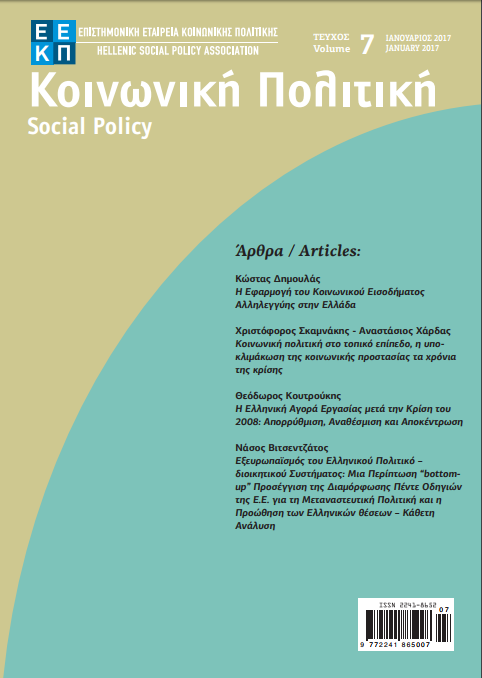Η Ελληνική Αγορά Εργασίας μετά την Κρίση του 2008: Απορρύθμιση, Αναθέσμιση και Αποκέντρωση

Abstract
Due to a huge public debt Greece has been obliged to ask for external financing by the EU, ECB and IMF and was committed to implement measures of reform (Memoranda). The evidence of the years 2010-2016 indicates the following developments: a) higher flexibility in the labour market b) reduction of minimum wages at the national and the sectoral level c) decentralization of the collective bargaining procedures and a shift of the bargaining process from the sectoral and/or professional level to the company level d) abandonment or extreme limitation of the arbitration procedure for several years e) promotion of the local employment pacts. Aim of this paper is to assess the impact of joint EC-ECB-IMF Programmes on the Greek industrial relation system, using an analysis of the institutional changes in the labour market and the social dialogue procedures. To sum up, the crisis has accelerated the organized decentralization and increased the shift to the domination of company level agreements.
Article Details
- How to Cite
-
Θεόδωρος Κ. (2017). Η Ελληνική Αγορά Εργασίας μετά την Κρίση του 2008: Απορρύθμιση, Αναθέσμιση και Αποκέντρωση. Social Policy, 7, 43–52. https://doi.org/10.12681/sp.14168
- Issue
- Vol. 7 (2017)
- Section
- Articles

This work is licensed under a Creative Commons Attribution 4.0 International License.
Authors who publish with this journal agree to the following terms:
Authors retain copyright and grant the journal right of first publication with the work simultaneously licensed under a Creative Commons Attribution Non-Commercial License that allows others to share the work with an acknowledgement of the work's authorship and initial publication in this journal.
Authors are able to enter into separate, additional contractual arrangements for the non-exclusive distribution of the journal's published version of the work (e.g. post it to an institutional repository or publish it in a book), with an acknowledgement of its initial publication in this journal.
Authors are permitted and encouraged to post their work online (preferably in institutional repositories or on their website) prior to and during the submission process, as it can lead to productive exchanges, as well as earlier and greater citation of published work.


